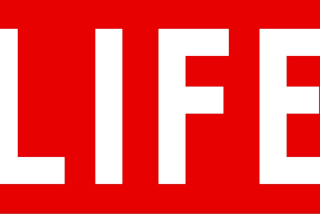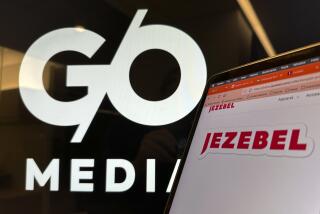Media : Focus Gives German Giant a Run for Its Readership : Conservative new magazine targets the Kohl generation, and left-leaning Der Spiegel faces stiffest competition ever.
- Share via
MUNICH, Germany — Frankly, almost everyone in the industry thought he was mad. When Helmut Markwort launched the flashy weekly magazine Focus to take on the behemoth of German journalism, Der Spiegel, they said he didn’t have a chance.
Der Spiegel was a cornerstone of German democracy, an institution. Gray and humorless, to be sure. Often impenetrable, but journalistically untouchable. Dozens of magazines had tried and failed to unseat Der Spiegel from its throne.
Two years and 620,000 readers later, Markwort gives a devilish grin as he recounts Focus’ success story from his high-rise, high-tech office.
“We’re No. 1 in advertising pages,” the editor said. “It looks like we broke even in 1994, our second year. In ‘95, we’ll make money.” Money that comes out of Der Spiegel’s pocket. And prestige.
Der Spiegel is still way out front in circulation, with more than 1 million loyal readers, and in political weight; it is required reading for the country’s political elite. But it no longer stands alone.
Focus is fat--322 pages in one pre-Christmas issue--and it has firmly established itself as Germany’s other weekly newsmagazine, a fact that apparently contributed to Der Spiegel editor Hans Werner Kilz’s fall from power last month.
Markwort, 58, says there is room in Germany for both magazines and that a jumpy Der Spiegel is simply overreacting to competition, to which it is unaccustomed. Competition that is growing by the day. Gruner & Jahr, publishers of the weekly picture magazine Stern, have now produced the downscale Tango, and Bauer Verlag KG is about to introduce another news weekly, tentatively titled Feuer.
For now, however, Focus is Der Spiegel’s primary competition. Markwort insists his goal is not to take away Der Spiegel’s readers--although he has captured tens of thousands of them--but to continue tapping into a new market, a generation of well-educated Germans who have grown up on computers in a country led by conservative Chancellor Helmut Kohl for the past 12 years.
Most of these people were not reading the left-leaning Der Spiegel because they did not like it. “Spiegel readers are believers who like to find their opinions confirmed from Monday to Monday,” Markwort said, enjoying a snipe. He called Der Spiegel “cynical.” “We offer another point of view.”
Yet Markwort bristles at the label conservative--or more conservative, as many critics describe Focus in comparison to Der Spiegel, the magazine that has prematurely written Kohl’s political obituary many times. Kohl refuses to speak to Der Spiegel but grants interviews to its competition.
“I am not a member of Kohl’s party, and, long before Focus, he said, ‘I don’t talk to Spiegel,’ ” Markwort pointed out. “Kohl talks to us because it’s normal for the chancellor to talk with a magazine. We talk with all the parties, the Greens and the reds (Social Democrats) and the blacks (Christian Democrats). . . . I wanted to have an opinion forum.”
Der Spiegel, based in Hamburg along with the liberal weekly newspaper Die Zeit, was a child of the Allied occupation of Germany. A British army major decided in 1946 that post-Nazi Germany needed an independent press and founded a weekly newsletter that he put under the stewardship of 22-year-old Rudolf Augstein, who impressed the major by refusing to bow and scrape to the victorious Allies. Augstein and his associates soon broke with their British mentors--and military censors--to form Der Spiegel.
For decades, the magazine had the field to itself. In West Germany’s miracle economy, it grew fat with advertising, complacent without serious competition and arrogant in its political convictions; it was the keeper of the truth.
Spiegel stories were long and often dull, written in enormous compound words and twisted sentences that came to be called Spiegelese. But the magazine did valuable reporting and provided intense criticism of governmental and political powers. And, as king of German journalism, it brushed off about 50 attempts by upstart magazines to compete. Until Focus came along.
Published in Munich by Hubert Burda’s wealthy publishing house, Focus follows the American model of weekly newsmagazines: shorter stories, more graphics, high gloss. Markwort spent 10 days at Newsweek in New York several years ago and has borrowed several of its features, including Periscope and the Conventional Wisdom Watch. Plus he has “news to use”: how-to sections on investments, computers, and other consumer goods and services.
“Focus has a little of all U.S. newsmagazines. Spiegel is all gray and black and white. . . . Kids know their fathers and grandfathers sit home and read Spiegel. Our readers are heavy users of computers and love our magazine because it looks like the windows on their PCs,” said Markwort, who once edited Munich’s TV magazine, Gong.
Focus’ style riles many in the press who see newspapers and newsmagazines looking more and more like television--brief and lacking depth. “This is about the survival of a serious press, which forms the base of every living democracy,” columnist Theo Sommer wrote on the front page of Die Zeit in December.
Spiegel senior editor Heinz Lohfeld describes Focus as “bites of information. It is fast-food news. Spiegel still offers a full meal.” He said Focus sells its magazines with “soft” covers that downplay the week’s hard news. Last month for example, Focus ran a cover on IQs, while Der Spiegel’s cover marked the 50th anniversary of the liberation of Auschwitz. Sommer, however, notes that Spiegel has responded with its own increase in soft covers, including a recent one on vampires that caused Spiegel sales to dip below a million for the week.
Lohfeld accepts that his publication underestimated Focus’ potential impact on the magazine market and “probably should not have ignored it.” But he denies that Spiegel has the jitters, and he rejects the opinion of Markwort and many others that editor Kilz was fired for failing to respond to Focus.
“Every magazine competes for any reader it can reach. But we have a completely different readership or we would have lost half our circulation instead of only a pittance,” Lohfeld said.
He acknowledges that Focus has the most advertising pages, with 6,000 last year, but not the financial volume of Spiegel or Stern. Spiegel still charges 80,000 German marks, or about $52,300, per page of color advertising, compared with 47,000 marks, or $30,700, for Focus, although Spiegel’s prices are going down while Focus’ rise.
Spiegel’s own move toward more color and shorter stories predates Focus, Lohfeld insists.
Markwort, meanwhile, lays his magazine side by side with Spiegel and smiles at all the hoopla it has caused.
“When I started, Spiegel editors laughed at me on TV. They said this was a 20-second try. Now they sit there on Friday and say, ‘What will he have on the cover?’ ” he said. “Look, Spiegel still exists. It’s still No. 1. But now we have normal competition in Germany.”
More to Read
Sign up for Essential California
The most important California stories and recommendations in your inbox every morning.
You may occasionally receive promotional content from the Los Angeles Times.












